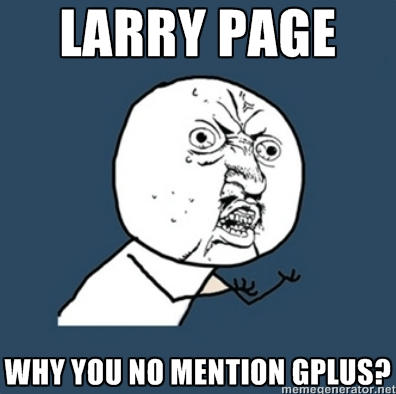I love the way Elisa Gabbert put it over on the WordStream Blog: The Future According to Larry Page: Outlook Lazy. But I really don’t agree with her leap to a conclusion that Page thinks “the future…will not be social, as Page might have had us believe in the past.”
She’s referring to the 2013 1st Quarter earnings call by Google CEO Larry Page. I liked her “lazy” metaphor for the general outlook of what Page highlighted. It ties together their nature: they are all things that will make the Internet more part of the fabric of life for the average user. Set it and forget it.
Innovations like Google Glass, voice commands, Google Fiber, Self-driving cars, phones that charge themselves, automated advertising platforms…all of these are examples of the kinds of products and services that will make the Internet of the future as much a part of the unconscious background of our daily lives as electricity now is for the developed world.
So Where’s Google+?
Elisa makes a big deal in the opening paragraph of her post about the fact that Page “didn’t mention Google” once on the call.” From that she concludes that “the future will not be social,” and I infer that Page has already lost interest in Google+.
That strikes me as simply absurd.
In published accounts of the earnings call, Page doesn’t have a lot to say about Google Search either. Anyone think Google is about to abandon their search engine?
But more importantly, every indication we have from Google’s behavior is that they are “full steam ahead” with the Google+ project.
We continue to see almost daily improvements to the Google+ platform and its mobile apps. Google+ engineers who post and engage on Google+ continue to giggle like school girls who’ve found a friend’s secret diary as they tease us about “you ain’t seen nothing yet” features and upgrades yet to come.
Moreover, Google continues to pursue the mandate that Larry Page gave the company in 2011: to unify all Google services and products under one (social) layer. For example, we see the continued integration of YouTube with Google+. Only last week Google+ finally rolled out a beta version of the ability for Google+ brand pages to sync with their branded YouTube channels.
All this attention hardly smacks of abandonment.
So….

So why didn’t Larry Page bother to mention Google+ in a talk about the future of Google? Because with Google+ the future of Google is already here.
Page’s vison for the future is for a “lazy web,” where you’ll just be able to do the things you want to do, without having to think about how to do them. Last week at the Digital Marketing for Business Conference in downtown Raleigh NC, Google+ Chief Evangelist Gopi Kallayil gave a keynote address on “How Google+ Will Change Everything.” Using Google+ features like Hangouts On Air, Google+ Local, and Instant Upload for photos, he demonstrated how Google+ is fulfilling the mandate that Larry Page gave to its development team to find a way to make all things Google work together seamlessly and without effort on the part of the user.
I firmly believe that Google+ is a long term project for Google. In a Google+ post I called “Why I’m Long Term Invested in Google+,” I said the following:
I’m a believer that Google is committed to G+ and has a brilliant (if sometimes frustrating) “long game” plan for it (see http://venturebeat.com/2013/01/05/why-the-google-long-game-is-brilliant/). This is typical modern-day Google. They have the resources and patience to walk out a long term strategy and to build slowly and carefully (as opposed to Zuckerberg’s “rush it out the door even if it doesn’t quite work yet” mentality). Google takes the luxury of carefully testing new features and rolling them out slowly, letting the users uncover what works and what’s broken, and then adjusting and fixing in response. On Google+ many of us regularly find Google engineers and execs interacting in our threads, getting our feedback and letting us know what they’re working on. That never happens on Facebook or Twitter.
And so bit by bit we see Google regularly rolling out changes and updates, and almost always they are real useful improvements that make it a truly better, more user- or business-friendly place, as opposed to Facebook’s too-often shot-in-the-dark catastrophes, like local check in and other ventures they roll out only to have to pull them a month or two later.
Moreover, Google+ is already contributing to the bottom line of Google without showing a single paid ad. Because of the lack of on-platform monetization pressure, Google+ can be the tortoise in the tortoise vs. hare race. They can patiently out-wait the competition, all the time investing in building the highest quality social platform, instead of tricks to try to get users to have to pony up cash and spam their own followers.






Excellent analysis, Mark and valuable reminder that Google’s strategy for Google+ isn’t isolated from that of Google itself but is intrinsic to it.
Thanks for the mention and analysis! I was sort of joking around when I said the future will not be social — clearly a lot of Google’s ventures depend on social activity — but I did find it very surprising that he didn’t mention Google+ once on the call. To me that signifies a kind of easing up on that particular product, which they have been pushing so hard in the past year or so. (He did, of course, mention the core search product multiple times.)
Hi Elisa, thanks for responding. I want to say first off that I meant what I said about how much I really liked your “going for the lazy” take on where Google innovation is heading.
Last week at the Digital Marketing for Business Conference in Raleigh I had the opportunity to grab nearly an hour in private conversation with Gopi Kallayil, the “chief evangelist” for Google+ to major brands. His office is next to Vic Gundotra’s (the head of Google+) who is next to Larry Page. I can’t disclose all we talked about, but I can assure you that if Page is “easing up” on Google+ (by not bothering to mention it in his call), it’s only because it’s already working so well that it won’t require a lot of major innovating down the road, just a continuing series of incremental improvements.
Sure, silence can mean neglect or rejection. But also, sometimes in a big family the well-behaved, over-achieving child doesn’t get as much attention 😉
Well you can’t argue with inside information. 🙂 It feels to me like a lot of the ways they’ve increased user adoption of Google+ have been sneaky (as in, want this really cool thing? oops, you just signed up for Google+ in order to get it!) so maybe it’s fitting that they’re pushing it as hard as ever, but slyly/silently.
Thanks again!
My guess is that Google is closer to “Minority Report” advertising than we realize. Glass and Now are the consumer beginnings.
You nailed it Mark with the long game that Google can afford to play. Remember when we found out in 2008 that google had stopped looking at keyword meta around 2006? Google has the wisdom to think a lot more before acting.
I think it has more to do with the Google philosophy than anything else. Google seems more interested in making things better for humanity that making bigger profits. Profit is a benefit, not a goal. It’s what a modern corporation should be. Google has become a steward of industry, something we need a lot more of. There’s a reason they are the most desired company to work for.
And.. even if I’m delusional about the ethical stance on commerce.. It’s the public perception that matters. 🙂
Google is playing with well planned ideas… Now they are updating user interface in Gmail frequently.Also it has been no longer they refined Google Plus home.